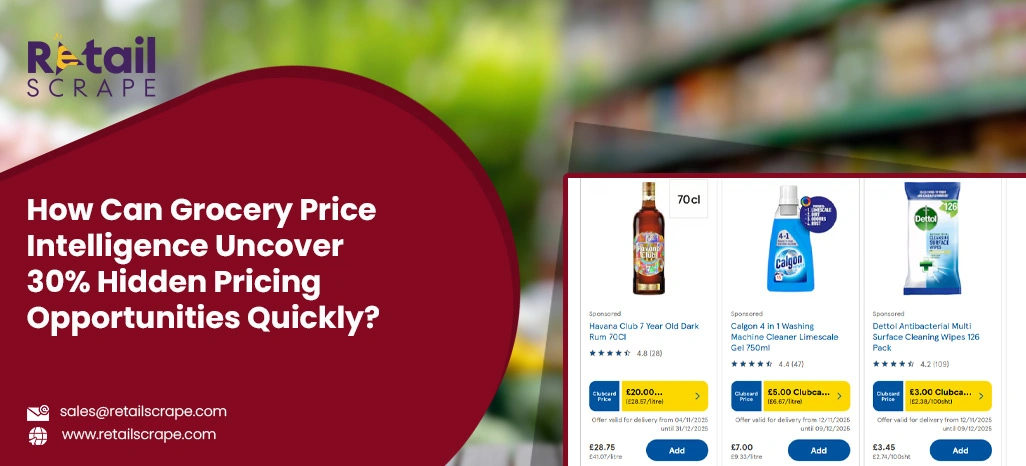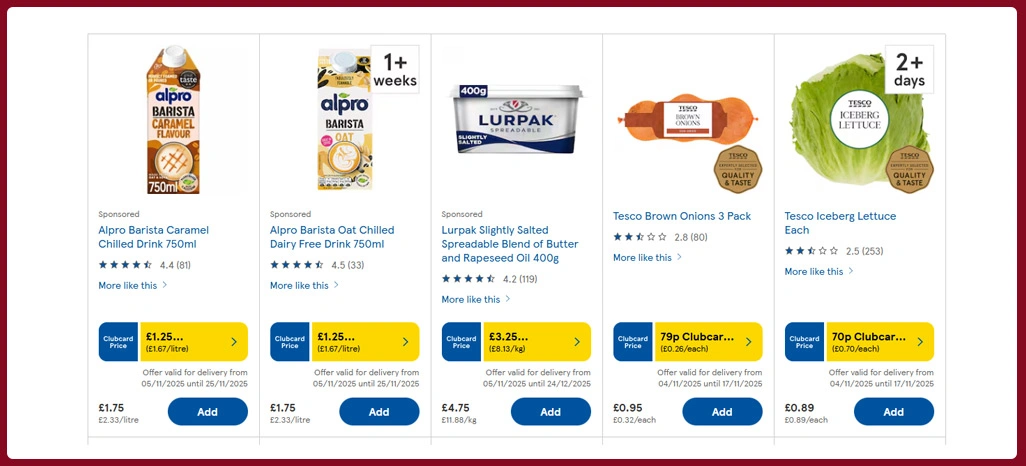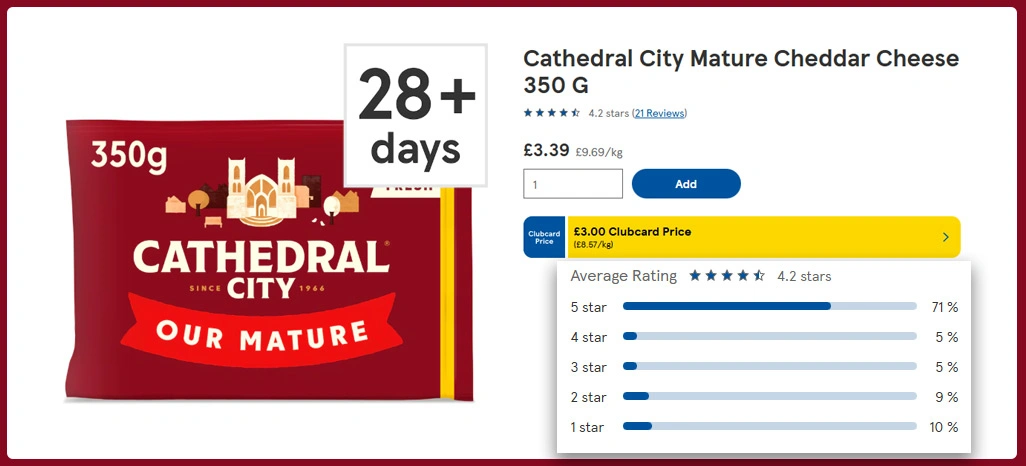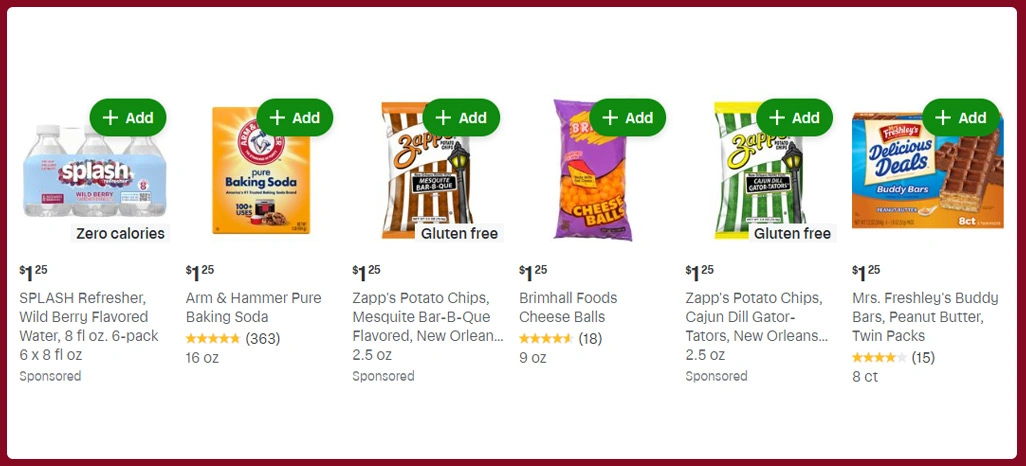How Can Grocery Price Intelligence Uncover 30% Hidden Pricing Opportunities Quickly?

Introduction
In today's fiercely competitive retail landscape, staying ahead requires more than intuition—it demands precise, data-driven insights. Retailers and FMCG brands are increasingly turning to Quick Commerce Data Intelligence to identify pricing opportunities and optimize revenue. With grocery markets expanding across online and offline channels, companies need a structured approach to monitor pricing trends, competitor actions, and market fluctuations efficiently.
By employing Grocery Price Intelligence, businesses can track price changes, evaluate market gaps, and make informed decisions that directly impact profitability. The ability to act quickly on emerging trends allows retailers to capture untapped margins, reduce overstock, and improve customer satisfaction. When combined with technology-driven analytics, this intelligence empowers decision-makers to anticipate competitor moves, implement dynamic strategies, and streamline operations.
The growing adoption of data-driven methods in retail highlights how crucial real-time insights are for maintaining a competitive edge. Brands leveraging this intelligence across multiple channels can significantly enhance pricing strategies and boost overall revenue.
How Retailers Can Identify Untapped Market Pricing Opportunities?

For retailers aiming to increase profit margins, uncovering hidden pricing opportunities is crucial. Grocery Data Scraping allows businesses to collect comprehensive product pricing information from multiple online and offline sources. This data helps in identifying pricing inconsistencies, promotional gaps, and potential areas for revenue growth.
| Metric | Before Implementing Strategy | After Implementing Strategy | Improvement (%) |
|---|---|---|---|
| Average Product Margin | 12% | 16% | +33% |
| Competitive Price Gap | 10% | 3% | -70% |
| Pricing Response Time | 7 Days | 24 Hours | -85% |
Incorporating Real-Time Grocery Price Tracking enables businesses to monitor live pricing changes and react immediately to opportunities. This real-time approach reduces revenue leakage and ensures products are competitively priced at all times. Using historical trends alongside current data, companies can create more accurate pricing strategies, enhancing profitability.
Additionally, integrating FMCG Price Monitoring allows for tracking seasonal performance, understanding consumer demand patterns, and identifying underperforming items. Retailers can leverage these insights to optimize promotions, adjust price points, and prevent inventory overstock. A well-executed pricing strategy not only increases margins but also enhances customer satisfaction and retention.
Strategies For Enhancing Pricing Accuracy Using Analytics

Effective pricing depends on understanding market trends and consumer behavior. Using Web Scraping for Grocery Analytics, retailers can aggregate competitor prices, promotion schedules, and inventory levels across multiple channels. This data allows for precise adjustments to pricing strategies, helping companies remain competitive while protecting margins.
| Metric | Before Analytics | After Analytics | Change (%) |
|---|---|---|---|
| Pricing Accuracy | 65% | 92% | +42% |
| Price Match Frequency | 2x per week | Daily | +350% |
| Revenue Impact | $500K | $750K | +50% |
Integrating Dynamic Pricing Insights ensures businesses can react to sudden market changes, such as competitor discounts or shifts in consumer demand. It also allows for more accurate forecasting, reducing risks associated with overstock or understock. Companies can identify underperforming products, implement price adjustments quickly, and improve overall revenue efficiency.
Additionally, this approach supports Grocery and Fmcg Data-Driven Decision Making, which aligns operational strategies with market realities. By combining structured analytics with real-time updates, retailers can make informed decisions regarding pricing, promotions, and inventory management.
How Product Portfolio Insights Can Improve Revenue Margins?

Maximizing profits requires evaluating the full product portfolio. Leveraging a Grocery Product Dataset enables retailers to assess price elasticity, category performance, and cross-product effects. This structured data helps identify revenue leaks and areas where strategic price adjustments can drive higher margins.
| Segment | Average Price | Competitor Avg | Recommended Adjustment | Potential Margin Gain |
|---|---|---|---|---|
| Beverages | $2.50 | $2.30 | +$0.15 | 6% |
| Snacks | $1.80 | $1.70 | +$0.10 | 5.5% |
| Dairy | $3.00 | $2.85 | +$0.10 | 4.5% |
Through Online Grocery Data Extraction, businesses can consolidate historical and competitor pricing data into a single repository. This provides actionable insights for adjusting price points, optimizing product placement, and identifying high-potential promotions. Companies can make informed decisions on underperforming products, reallocating resources to maximize profit.
Web Scraping for Grocery Prices further allows continuous monitoring of market activity, ensuring businesses can respond to changes swiftly. This combination of structured datasets and real-time monitoring strengthens strategic decision-making and improves the efficiency of pricing operations.
How Retail Scrape Can Help You?
Retailers seeking actionable insights can benefit significantly from advanced data scraping solutions. By integrating Grocery Price Intelligence, businesses gain a holistic view of market pricing trends, competitor performance, and promotional strategies across all relevant channels.
- Streamline competitive price tracking across multiple platforms.
- Consolidate fragmented market data into actionable dashboards.
- Identify seasonal and regional pricing variations effortlessly.
- Improve inventory and assortment planning using data-driven insights.
- Enable precise demand forecasting to reduce overstock and wastage.
- Support decision-making with highly accurate market intelligence.
Our services also integrate Real-Time Grocery Price Tracking to provide up-to-date information for timely decision-making, helping retailers maximize margin opportunities and stay competitive in evolving markets.
Conclusion
Harnessing Grocery Price Intelligence allows retailers to uncover hidden pricing opportunities and optimize revenue streams effectively. Businesses that integrate this approach gain access to structured, actionable insights that enhance overall profitability and competitive positioning.
Additionally, employing Online Grocery Data Extraction supports continuous monitoring of competitor activity, enabling smarter, quicker adjustments to pricing strategies. Partner with Retail Scrape today to transform your pricing approach and achieve sustainable growth.
